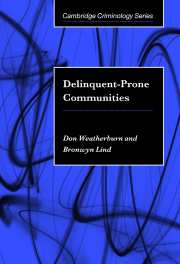Book contents
- Frontmatter
- Contents
- List of figures and tables
- Acknowledgments
- Overview
- 1 The ESIOM paradigm and its problems
- 2 The insidious effects of economic and social stress on parenting
- 3 Parenting, peers and delinquency
- 4 Delinquency generation at the individual level
- 5 Delinquency generation at the aggregate level
- 6 An epidemic model of offender population growth
- 7 Theories of crime and place
- 8 Prevention
- Notes
- References
- Index
5 - Delinquency generation at the aggregate level
Published online by Cambridge University Press: 22 September 2009
- Frontmatter
- Contents
- List of figures and tables
- Acknowledgments
- Overview
- 1 The ESIOM paradigm and its problems
- 2 The insidious effects of economic and social stress on parenting
- 3 Parenting, peers and delinquency
- 4 Delinquency generation at the individual level
- 5 Delinquency generation at the aggregate level
- 6 An epidemic model of offender population growth
- 7 Theories of crime and place
- 8 Prevention
- Notes
- References
- Index
Summary
Individual-level research studies make a convincing case that incompetent parenting is one of the major causal pathways through which economic and social stress influence individual offending behaviour. Yet, by themselves, they are incapable of resolving the question of whether the aggregate-level association between economic stress and crime is mediated mainly by such parenting. There may be other more important ways in which economic stress influences juvenile participation in crime. To show that the economic stress and aggregate crime rate relationship can be explained in terms of the effect of economic stress on parenting we need to examine the interrelationship between economic stress, parenting and juvenile participation in crime at both individual and aggregate levels.
The first aim of this chapter, then, is to assess whether economic and social stress increase rates of juvenile involvement in crime largely because they increase the prevalence of criminogenic parenting practices. The second aim is to see whether there are any measurable neighbourhood effects at the aggregate level. We examine these effects for both property and violent crime. We also examine the relationship between economic stress and parental behaviour for both adult and juvenile participation in crime. Finally, to assess how important rates of participation in crime are as determinants of the level of crime, we examine the relationship between criminal participation rates and aggregate crime rates.
- Type
- Chapter
- Information
- Delinquent-Prone Communities , pp. 78 - 101Publisher: Cambridge University PressPrint publication year: 2000



